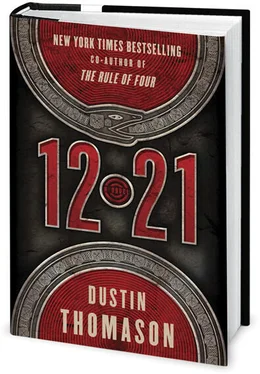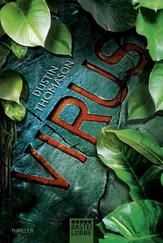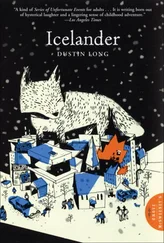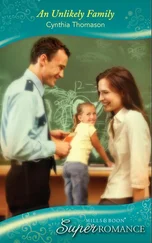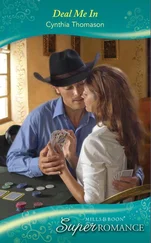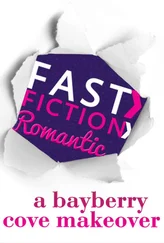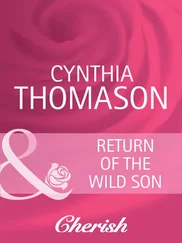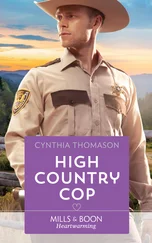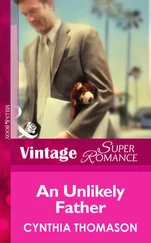Once they both had on eye shields, he led them toward the open door.
Something felt wrong right away. The entrance was pitch-black. Stanton scanned the room with his flashlight. It was the clinical bay. Curtain rods separated one examining area from the other. Splintered wooden chairs marked where patients usually waited. There was no life here, and it didn’t feel like there had been for a long time.
“ In ri’ ali Chel ,” Chel called out as they stepped inside the darkened room, her voice echoing. “ Umyal ri al Alvar Manu .”
I am Chel, daughter of Alvar Manu.
No response.
Rounding the corner into the examination area, their flashlights caught paper strewn across the floor. Then chairs, turned over, soaking in puddles of antiseptic that had been spilled on the ground. A ceramic container was shattered, and shards were mixed with soaked cotton balls and long Q-tips. Flies the size of quarters buzzed around them. The space reeked of ammonia and what smelled like excrement.
Stanton reached into his pocket and pulled out two pairs of latex gloves. “Don’t touch anything with your bare hands.”
As she struggled to maneuver her sweaty hands into the gloves, Chel called out loudly again in Qu’iche that she was the daughter of Alvar Manu and that she had come to help. Her own voice sounded weak to her, but it echoed in the empty room.
Continuing through the building, her worry grew. These rooms were not just abandoned—they had been vandalized. Beds lay on their sides and the stuffi ng had been ripped out. There was glass everywhere. Stanton opened the cabinets and rummaged through the drawers, looking for the medical supplies: Someone had taken most of them.
At the far end of the hallway, Chel pushed open the doors to the small chapel. She scanned her Maglite across the front and saw that the large wooden cross had been pulled from above the pulpit and smashed into pieces. The beautiful stained-glass window was in shards on the ground, and ripped pages from Bibles and copies of the Popol Vuh were strewn over the pews and into the aisles.
Then she saw a familiar symbol, and all Chel’s remaining hope vanished.

Chel heard Stanton come into the chapel behind her. “Even the indígenas believe it now,” she whispered. “Maybe it’s true.”
He said nothing, but Chel felt his hand squeezing her shoulder. When she reached up to take it and her glove made contact, she noticed the hand was bare.
She whipped around. “Who are you?”
The stranger didn’t answer. He was tall. He wore a hooded sweatshirt with a rust-colored stain splashed across it. And he wasn’t Maya.
“ Qué está haciendo aquí? ” she said in Spanish.
How or why a ladino was here now, Chel didn’t know. Her mother’s words of warning echoed in her ears. Her heart pounded as she backed away. “ Estoy aquí con un médico. Gabe! Gabe! ” She screamed, but her voice felt so weak. She couldn’t breathe.
The ladino lunged at her and pulled her down. He ripped off her eye shield and jammed his hand over her mouth. She tried to scream again, but she couldn’t. Chel pawed at his face, but he bore down, wrapping his other hand around her throat. She knew what could be on his hands and squeezed her eyes shut as tightly as she could. Only it was no use: She’d be dead long before she was sick.
I am Chel Manu, daughter of Alvar. Kill me like you killed my father.
That was her last thought before the gun went off.
STANTON’S HANDS SHOOK AS HE TURNED THE KEY IN THE IGNITION and started the jeep. He’d killed a man. The gun he’d used was on his lap, ready to be used again. There had to be others infected out there in the darkness ahead. But it seemed better to start moving again than to stay here.
Chel slumped in the passenger seat next to him, numb. It would be some time before they would know if her attacker had managed to infect her before Stanton killed him. Even the rapid blood assay wouldn’t tell him anything for a few more hours.
Tiny clouds of mosquitoes swarmed the headlights as they drove down the road leading on to the village proper. But as they made their way closer, Stanton could see in the high beams what must’ve been the source of the black smoke they’d seen at the landing strip. It was a smoldering building about the size of the medical facility. The walls had collapsed; limestone had shattered. There was no roof.
“That’s the school,” Chel said, all emotion gone from her voice.
They kept going. The remains of single-room houses cropped up on both sides. Four or six stood in clusters every several hundred feet, each with its single door and no windows. Adobe-covered wooden walls had been knocked down; palm fronds that once covered roofs, pulled off. In the middle of the road were dozens of hammocks that looked as if they had been dragged from one of the houses and abandoned. Red and yellow and green and purple cloths were cast aside and covered in mud, and the jeep’s tires ran unsteadily over the graveyard of color.
Part of Stanton wanted to drive the car out of town and stay the night in a field. They were done looking for others; now they were trying to avoid them. But he also thought the jeep might draw more attention to them than they’d elicit if they hid it and sheltered themselves in one of the abandoned buildings.
He pointed at one house they drove by that still appeared untouched. “Do you know the people who live there?”
Chel didn’t seem to hear him. She was somewhere else entirely.
Stanton decided it looked as good a place as any. He parked the jeep and led Chel toward the house, holding the gun with his free hand. He knocked at the door, and, when there was no answer, he kicked it open.
The first things his flashlight caught were two bodies in a hammock. A young woman and a toddler. It looked as if they’d been dead for at least a week.
Stanton tried to stop Chel from getting any closer, but she was already in the doorway, staring at the bodies.
The sound of her voice surprised him. “We need to bury them. I need incense.” She obviously wasn’t thinking clearly.
“We can’t stay in here,” he told her.
He grabbed her hand again, and they kept going. In the next dwelling, there were no corpses, just clothing strewn on the ground, a broken hoe, and ceramic bowls. Stanton cleared everything out.
“You think it’s safe?” Chel managed.
He had no proof, but it was the best they had. “We need to keep our eye shields on.”
They collapsed against a wall, huddling together, exhausted. Stanton pulled granola bars from the supply pack and forced Chel to swallow several bites. Finally he turned off the flashlight, hoping she might be able to sleep. He would try to stay awake, on guard.
“Do you know why we burn incense for the dead?” she whispered.
“Why?”
“When a soul is taken, it needs the incense smoke in order to pass from the middleworld to the underworld. Everyone here is stuck between worlds.”
Over the last couple of days, Stanton had heard her talk quite a lot about her people’s traditions, but not this way. He wanted to reassure her but didn’t know how; only the faithful had the right words for times like these. Instead, he turned to what he knew. She was still convinced that something had protected the king and his men from VFI before the outbreak of disease in Kanuataba. Tomorrow they would find it. “We have the map and the coordinates for Lake Izabal,” he told Chel, “and as soon as it’s light, we’ll start searching.”
Читать дальше
